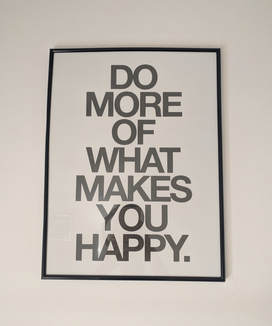 I wrote this post while staring at this picture that someone hung in my apartment in Croatia. It seems apt. I wrote this post while staring at this picture that someone hung in my apartment in Croatia. It seems apt. When I initially thought of the idea for the “When I Was 17” project, I had a hypothesis that the pressure today’s students feel to choose a major at 17 that would lead to a clear career that you could do for decades and decades was unreasonable. I believed that, for most people, the path to their career was more like the Road to Hana than Eyre Highway (Australia’s longest straight road – look it up!). After 15 interviews, that idea has mostly born out. But a few other things have become clear too. 1. Some people do know exactly what they want to do when they grow up. Talking to people like Melissa Smith and Dvir Hazout, I was so struck by the fact that they did actually know what they wanted to do for their careers. And they went out and did it – and they love it. But even when you know what you want to do, there are still scores of variables to consider: where you want to work, whether to work for yourself or someone else, what kind of company or industry you want to work for. Those variables have made Melissa’s and Dvir’s career paths unique, even from other people who do the same jobs. Even when you know what you want to do, there are still choices to be made and moments of uncertainty. 2. It’s never too late to change direction. Part of what makes this decision feel so stressful is the idea that you can’t change your mind. But one of the things Jessica Fradono emphasized in her interview is that you can always start down a new path – even 20 years in. She made several moves in her career, from psychology to hospitality, from hospitality to human resources, and most recently (and dramatically) from HR to photography. Even when it’s difficult, even when it means letting go of something good, you can always go back to school or learn a new skill and start over. And chances are, the experience you’ve acquired up to that point will actually benefit you in your next career. 3. Some of it just comes down to luck. One of the things that makes people nervous about pursuing a humanities degree is how abstract it seems. No one would deny the value of strong writing and critical thinking skills, but the lack of a clear line from diploma to profession can feel paralyzing. Where do you even start? For people like Sari Abdo and myself, the path from graduation to first job was almost random. We applied to a broad range of openings and chose an entry-level job with a company we liked; for Sari it was marketing at a startup, for me it was higher education administration at Stanford University. That initial decision pointed us down the paths we’ve continued to follow to the present day. If I had gotten a job at a different company, or even in a different department at Stanford, I might have gone in a totally different direction. 4. Your dream job might not exist yet. Open any issue of Harvard Business Review or Forbes and you’ll see a discussion of how rapidly the professional landscape is shifting. Entire industries are now reliant on technologies that didn’t exist five years ago. And we have to be reminded that jobs that seem commonplace – web development, UX design, social media marketing – are actually fairly recent inventions. So how can you possibly choose a major that will lead to a job you’ve never heard of? Phil Belleau is a great example of someone who worked to develop a diverse set of skills that could be applied to many jobs. And when he found a position that was a combination of those things, he was able to articulate what made him a good fit for this brand new role. By staying open, he was actually better prepared than if he had honed in on one professional trajectory. 5. Sometimes your work and your passion are two different things. We’ve all heard the adage, “Do something you love and you’ll never work a day in your life.” I can whole-heartedly say that I love being a college counselor, but it still feels like work – especially compared to reading books and drinking piña coladas in Maui. Work can be an extension of your life’s purpose. I think many of us at Collegewise would characterize their jobs as such. But work can also be the thing that enables you to do the other things that you love. Many of my fellow Roamers have really come to value the flexibility their jobs allow them, particularly to travel and work remotely this year. And some of them are starting to prioritize that in a whole new way as they consider their next professional moves. So instead of asking yourself, “What do I want to do for a living?” ask, “What kind of life do I want to live?” And then build a career that works for that.
0 Comments
Leave a Reply. |
What is the When I Was 17 Project?When I Was 17 is a blog series dedicated to collecting the varied stories of people's career paths, what they envisioned themselves doing when they were teenagers and how that evolved over the course of their lives. I started this project with the goal of illustrating that it's okay not to know exactly what you want to do when you're 17; many successful people didn't, and these are a few of their stories.
Archives
October 2020
|